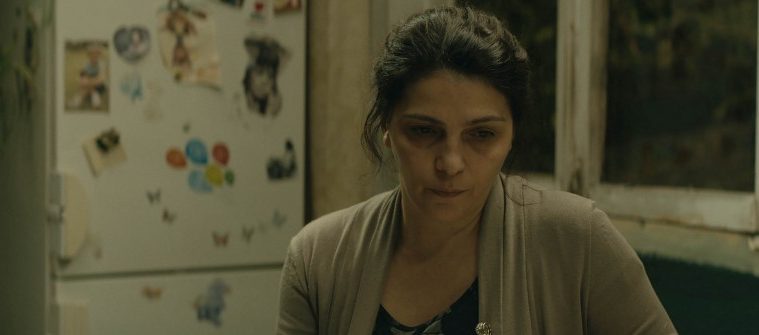Nature abhors a vacuum, and so too does human curiosity. Anyone seeking to throw the world around them into chaos should do something unexpected and dramatic, and then refuse to answer for their reasoning. Into the silence where an explanation ought to exist, people will begin to pour their own inferences, composed either of wild theories, projections of their own insecurities, or secrets they assume are now common knowledge. In the end, thanks to the means by which humanity seeks to make sense of the unexplained, a single change for an unspoken reason is often just the beginning of a near cataclysm of life-altering changes for anyone in the immediate area.
In My Happy Family, the stirring and gorgeously naturalistic drama by directors Nana Ekvtimishvili and Simon Groß, a woman discovers just how much chaos a single decision can cause. Manana (Ia Shugliashvili) is a school teacher who lives with her husband, her son and daughter, her son-in-law, and her mother and father. After years of enduring this living situation, she announces – on her birthday of all days – that she is planning on moving out into an apartment of her own. No one can understand why she would do this, especially since her husband is not abusive, does not drink to excess, and everyone in her family loves her.

Manana, to her credit, never explains herself to anyone, and neither does the film explain her choice to the audience. Of course some reasons are as clear as day. The apartment she inhabits with her extended family is small, cramped, and filled with noise. The camera moves within the space with a sense of claustrophobia and anxiety, trembling as it seeks to makes its way through the crowd. The noise, likewise, composed of footfalls and moving objects and a sea of hectoring, rising voices, overpowers the soundtrack. Meanwhile, in her private apartment, Manana is allowed to sit in silence, as does the camera, and the sound of birdsong, wind, and music fills the air.
This evocation of space and atmosphere is the greatest strength of My Happy Family. Despite tracking a narrative that could be dismissed as being too familiar – a middle-aged woman finally finds happiness – the film manages a level of specificity and honesty that makes it feel like a truly original story, rather than a riff on an archetype. Much of that may come from the grounding of the narrative in Georgian culture. For long stretches, one could be forgiven for thinking that this movie was a musical, given how often the characters devote themselves to singing and playing instruments. Nearly every song is allowed to play out in its entirety, and each has its own purpose within the story.
Shugliashvili, as the center around which the chaos of the narrative spins, is an instantly engaging presence. Rather than play Manana as an object of sympathy, she plays her as an object of curiosity. The movie never for a second judges her decision to move as an act of desperation, nor does it look back on her life before the move with mourning. She has made a decision that is the best for her, and from that moment on the film allows her to live that decision’s reality with truth and objectivity.

What is most admirable and most interesting about My Happy Family, though, is the way in which it tracks the response of the people around Manana. Everything is viewed through her perception, and slowly but surely one can see how her choice acts as a harbinger of a new and perhaps better life for those around her. Her daughter shakes herself out of her own marital funk. Her husband must reckon with his failings. Her friends must take stock of their own choices. And, most importantly, the new impression of her as a strong and independent woman allows for certain people to treat her with more maturity and a possibility-misguided sense that she knows and understands more than she does. Life for Manana will never be the same, for better and worse, but it will become more wholly hers.
My Happy Family borrows and remixes the social realism and aesthetic formalism of the Dardennes in a way that allows it to exude an energy all its own. With a remarkable fullness of understanding, it tells a deeply personal story while revealing essential human truths, all without ever feeling constructed or false.
My Happy Family screened at Berlin Film Festival and will be released by Netflix on December 1.

